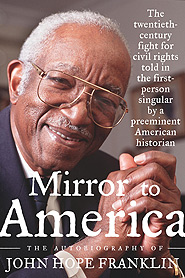Berkeleyan
Holding a mirror to America
Renowned historian John Hope Franklin to appear in conversation with campus faculty
![]()
| 08 February 2006
 |
A scholar of the American South and African American history - one who has made history himself - will be in Berkeley next week as part of a national tour to promote his new memoir, Mirror to America: The Autobiography of John Hope Franklin (Farrar, Straus and Giroux). The internationally known historian will be interviewed by law professor Harry Scheiber on Thursday, Feb. 16, at the First Congregational Church of Berkeley (2345 Channing Way, at Dana).
"John Hope Franklin is a great leader in the academic world and an important public intellectual," Scheiber says of his longtime friend. "He's one of the great American historians, not only for pathbreaking work on the history of African Americans but for his writing on Southern culture, American law and race relations, the Civil War period, and social history."
Born in Tulsa, Okla., in 1915, Franklin writes in the opening pages of his long-awaited memoir that it was no more possible to escape the "racist barbarism" that bore down on him, and other black children, as a child "than one today can escape the industrial gases that pollute the atmosphere." That climate, he goes on to say, "touched me at every stage of my life."
Against great odds, Franklin became a Harvard-educated historian who rose to the pinnacle of his field. Among his 17 books, the best known is the 1947 work he co-authored with Alfred Moss, Jr., From Slavery to Freedom, a detailed account of the African American journey from the civilizations of Africa through slavery in the New World and the protracted struggle for freedom and equality in the U.S. and the rest of the Western Hemisphere; now in its eighth edition, it has been read by generations of students. Franklin's appointment as chair of the Brooklyn College history department in 1956 - the first African American named to head a history department outside a traditionally black college - made the front page of The New York Times. He has taught and lectured around the world and served numerous organizations and commissions, including President Clinton's task force on race (which he chaired). His scores of national and international awards range from the Presidential Medal of Freedom to, closer to home, the Clark Kerr Award, the highest honor of the Berkeley Academic Senate.
Campus scholars in history, African American studies, and law will help jump-start next Thursday's conversation with Franklin. One among them, history professor Leon Litwack, served as teaching assistant to Franklin in 1956, when the latter was on campus as a visiting professor. Litwack says his mentor and colleague changed history by "demonstrating to a skeptical and indifferent profession that African American history was a legitimate subject for scholarship." While "never factional, never reducing African Americans to heroes and heroines," he introduced Americans not only to the history of African Americans but, more radically, to the idea that African Americans have a history - a past based "not only on what white men did to black Americans," Litwack says, "but on what black Americans did for themselves."
Litwack recalls visiting the primary repository of materials on free blacks in the North, as a young scholar, and finding it "just about empty." That was in 1957. When he returned 10 years later, "the place was filled with people." John Hope Franklin, by advancing the legitimacy of the field, "was a pivotal figure" in this transition, says Litwack.
The conversation with Franklin is sponsored by Cody's Books and begins at 7 p.m.

